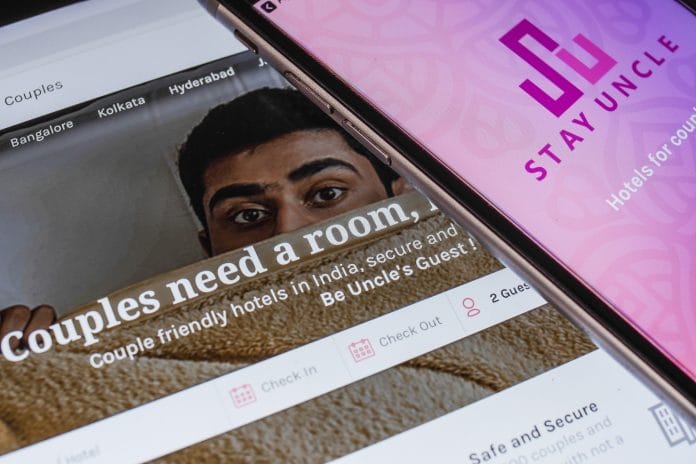Judgement free hotel stays for couples, and easier dating options for the LGBT; the new startups of India are making profits by catering to nonconformists.
Pankaj Chowdhry knows first hand how difficult it is for young, unmarried couples in India.
The 25-year-old automotive engineer lives with his parents in New Delhi, while his girlfriend of four years lives with hers. They long struggled to get private time together in a society where premarital sex is a no-no and their only options were seedy guest houses with exorbitant fees and invasive questions.
Not anymore. Chowdhry can now book a few hours at a respectable hotel with a smartphone app called StayUncle, which specializes in short daytime stays. It’s part of a wave of young startups that are building businesses out of breaking centuries-old stigma surrounding sex, romance and relationships in one of the world’s most traditional cultures.
“My girl doesn’t have to mummify her face with a scarf or deal with employees’ sleazy stares,” he said. “We get away from the public eye and feel safe.”
India is a place like no other when it comes to sex. Police raid hotels where canoodling couples try to snatch private moments. Gay partners can face criminal prosecution, while second marriages are actively discouraged in many places. Premarital sex isn’t technically a crime, but it is legally dubious enough it took a Supreme Court decision a few years ago to clarify that couples couldn’t be sent to jail for conjugal relations outside of marriage.
Technology is beginning to change practices, if not morals themselves. A startup app called Delta brings together gay singles, while Inclov handles match-making between the physically handicapped. Secondshaadi helps liaisons between the divorced and widowed, long shunned as inauspicious partners. New Delhi-based StayUncle’s tagline? “Couples need a room, not a judgment.”
The startups see growth ahead. The Internet and Mobile Association of India estimates the country will have 478 million mobile web users by this summer, with millions of younger locals looking to connect through mobile devices.
“Smartphones are helping reach users however dispersed they may be, making it viable for niche businesses to breach social barriers,” said Anupam Mittal, a Mumbai-based angel investor who founded online matrimonial service Shaadi.com.
New Delhi-based Delta, like many of the startups, is part business, part passion project. Founder Ishaan Sethi was bullied as a boy in India, came out while studying at Brown University and then worked in New York before returning home. The LGBT dating app aims to help users find matches, counselors and gay-friendly spaces, even in smaller cities where blackmail and extortion have been widespread.
“We counsel them about coming out, help find partners, jobs and therapists,” said Sethi.
Shankar Srinivasan co-founded Inclov in 2016 because he thinks it’s unfair that the country’s disabled don’t have better opportunities for finding romance and love. The startup has 30,000 registered users and arranges meet-ups at yoga studios, beaches or night clubs. It’s already made 8,000 matches.
“We are giving disabled people an equal shot at relationships,” Srinivasan said. “It’s a fully-inclusive place where even those without disabilities are welcome.”
Sanchit Sethi grew up in obscure, conservative Jaunpur in central India before founding StayUncle. Sethi, who is not related to Delta’s founder, initially targeted business travelers, but swiveled in 2016 when he saw soaring inquiries from young couples desperate for privacy.
The transition wasn’t easy. When Sethi and Macedonian co-founder Blaze Arizanov began touting the proposition, hotel owners gave them innumerable moral lectures that began “Arre beta” — or hey son. “They called us evil, said sex before marriage is a sin, and accused us of supporting prostitution,” said Sethi, 29.
The founders got personal threats on their Facebook page. One mother cursed them for exposing her young daughter to such culture. Getting the first 20 hotels was arduous but after that, owners began signing on. The service now lists 900 hotels in 35 cities, including socially conservative places like Patna and Bhopal.
Even Sethi’s parents steadfastly refuse to discuss his startup with their son. But business is booming.
“After 18 months, we are more profitable than established, better-funded travel and hospitality startups,” he said.
Sethi and others benefit from millennials who are chipping away at social conventions. Sakshi, a 19 year-old Delhi student, is a frequent StayUncle user with her partner, also a student. She and her friends talk openly to each other about the service — a recent student-managed event at her college even gave away StayUncle stay coupons as prizes — but they don’t share with their parents.
“My parents will never approve of a boyfriend, let alone sharing a hotel room with him,” said Sakshi, who didn’t want her last name revealed. “We’re a different India.”
-Bloomberg






